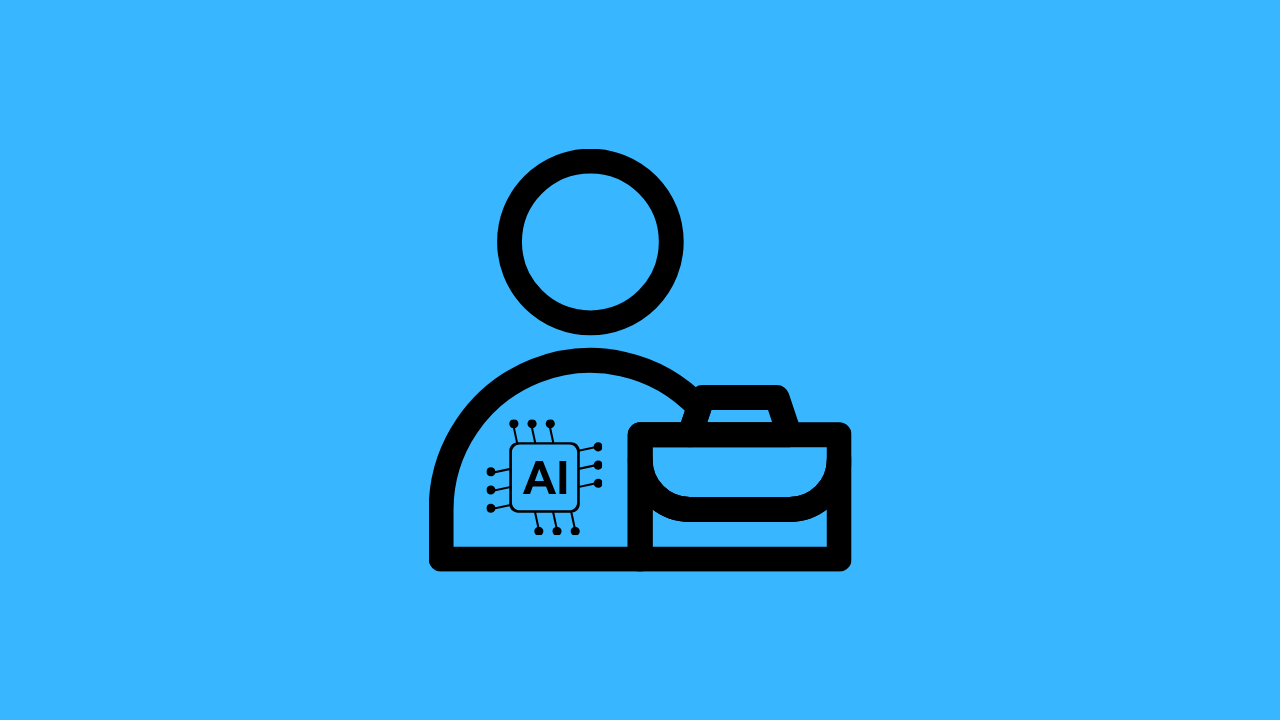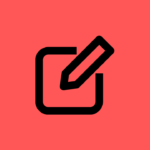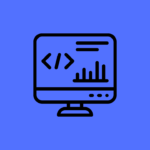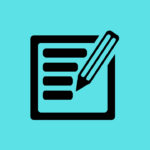Introduction
In the competitive world of job recruitment, finding the right talent efficiently is crucial. Artificial intelligence (AI) has transformed the recruitment landscape, offering tools that streamline hiring processes, improve candidate matching, and enhance decision-making. From resume screening to candidate engagement, AI tools can significantly optimize recruitment workflows. In this comprehensive guide, we will explore the top 10 AI tools for job recruitment, detailing their features, benefits, and how they can revolutionize your hiring process.
What is AI in Job Recruitment?
AI in job recruitment involves using artificial intelligence technologies to automate and enhance various aspects of the hiring process. These tools leverage machine learning algorithms, natural language processing, and data analytics to improve candidate sourcing, screening, and engagement, making the recruitment process more efficient and effective.
Top 10 AI Tools for Job Recruitment
1. Eightfold AI
Eightfold AI is a leading Talent Intelligence Platform that uses deep learning to match candidates with open roles, identify skill gaps, and promote internal mobility. It goes beyond traditional ATS systems by using AI to understand a person’s potential — not just their past experience. The platform helps companies with recruitment, retention, reskilling, and workforce planning — all from a single unified system.
Best for:
Enterprises and large organizations seeking AI-driven talent analytics, internal mobility, and upskilling programs.
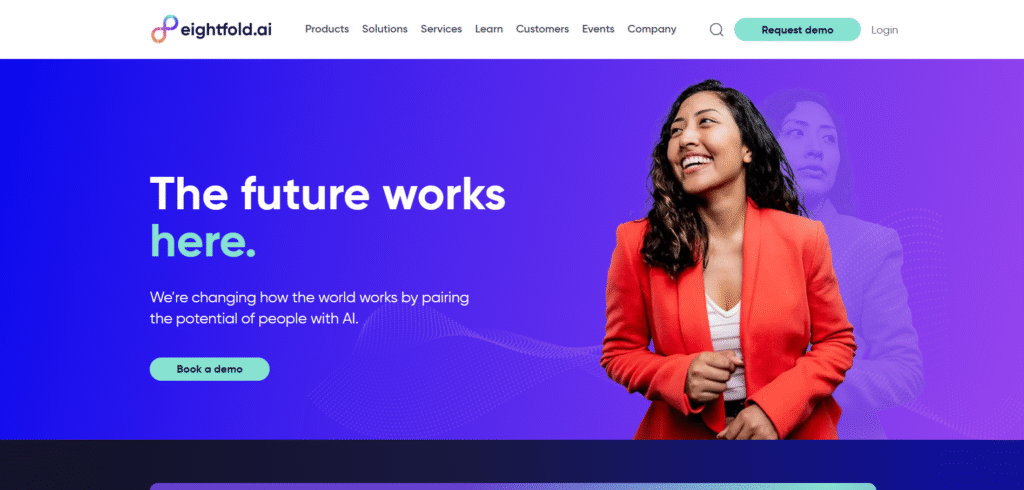
2. hireEZ (formerly Hiretual)
hireEZ is an AI sourcing and recruitment CRM platform designed to help recruiters find and engage passive candidates. It searches across 45+ open web platforms, enriches profiles with verified contact data, and automates outreach with personalized messaging. Its AI ranking engine identifies top-fit candidates based on skills, experience, and job intent.
Best for:
Recruiters focused on sourcing hard-to-find or passive candidates efficiently across multiple platforms.
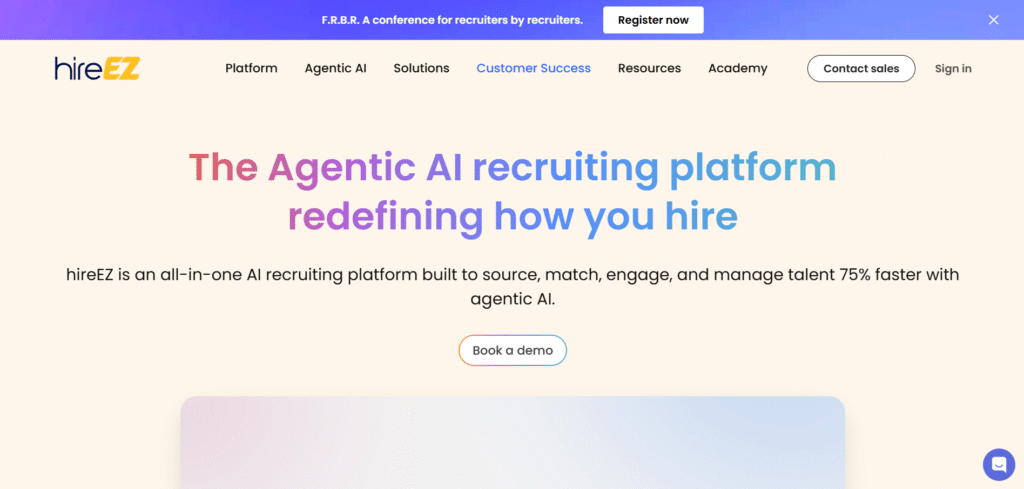
3. Gem
Gem unifies candidate sourcing, CRM, analytics, and email outreach into one intelligent platform. It integrates seamlessly with ATS tools like Greenhouse or Lever and provides pipeline analytics, conversion tracking, and diversity reporting. Gem’s AI predicts candidate response likelihood and automates personalized outreach sequences — improving recruiter efficiency.
Best for:
Mid-to-large hiring teams wanting end-to-end recruitment CRM and analytics capabilities.
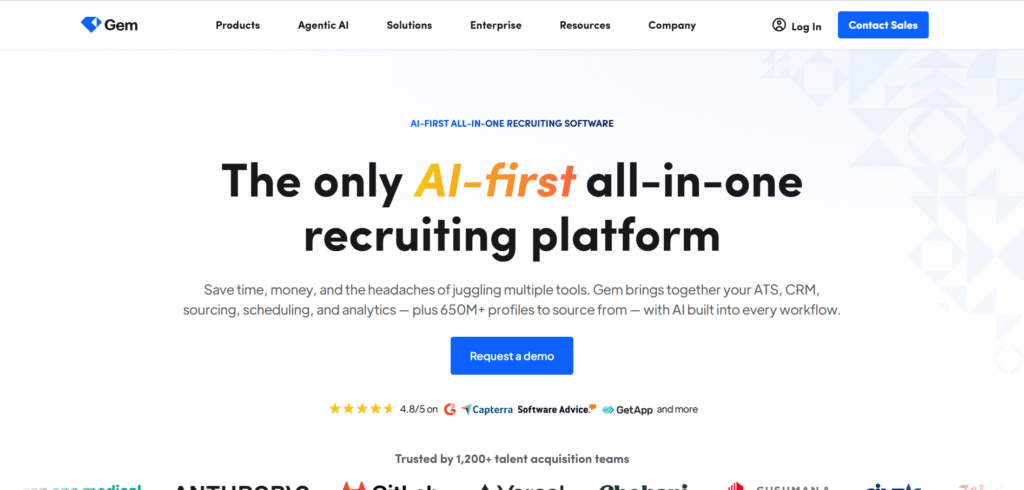
4. Paradox (Olivia)
Paradox uses conversational AI — nicknamed Olivia — to automate candidate interactions, screening, and scheduling. Olivia answers candidate queries 24/7, pre-screens applicants, coordinates interviews, and integrates directly with major ATS and HR systems. It’s highly effective for high-volume or frontline roles, where candidate experience and speed matter most.
Best for:
Organizations in retail, hospitality, logistics, or healthcare managing large-volume hiring.
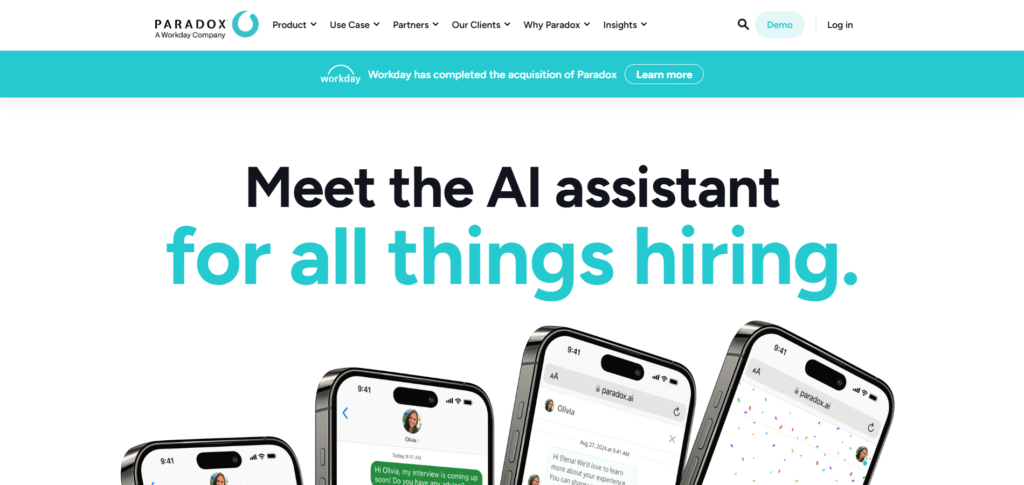
5. Fetcher
Fetcher combines AI with human verification to automate sourcing and outreach. The system scans millions of online profiles to deliver pre-qualified candidates that match your role requirements. Recruiters can set automated email cadences and track engagement metrics — making it a smart blend of automation and personalization.
Best for:
Startups or mid-size teams who need fast, scalable sourcing without losing the human touch.
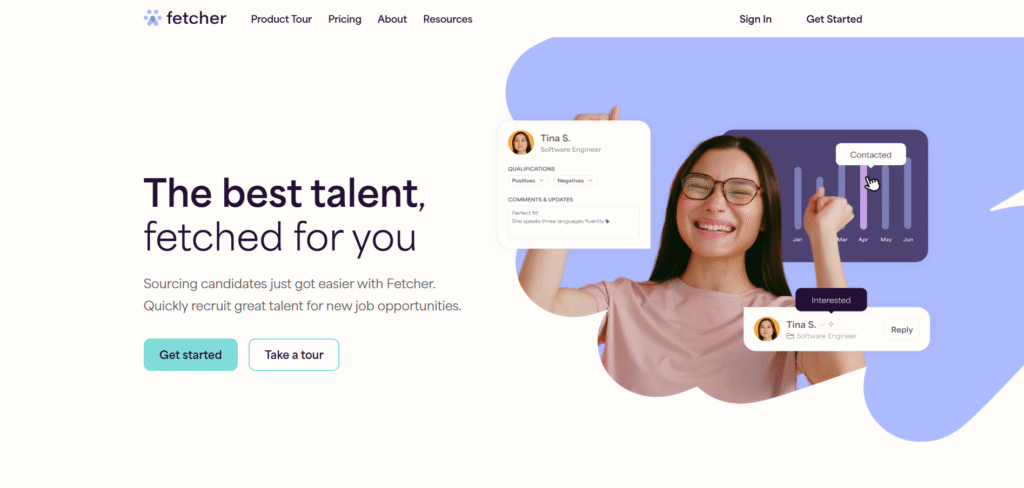
6. Juicebox
Juicebox, powered by PeopleGPT, is an AI recruiting engine that searches over 800 million professional profiles to surface ideal candidates. It automates outreach, integrates with ATS/CRM systems, and provides real-time candidate recommendations. Recruiters can use natural language queries (like “Find marketing managers in Bangalore with fintech experience”) — making it intuitive and fast.
Best for:
Recruitment agencies and scaling startups that rely heavily on external sourcing and precision matching.
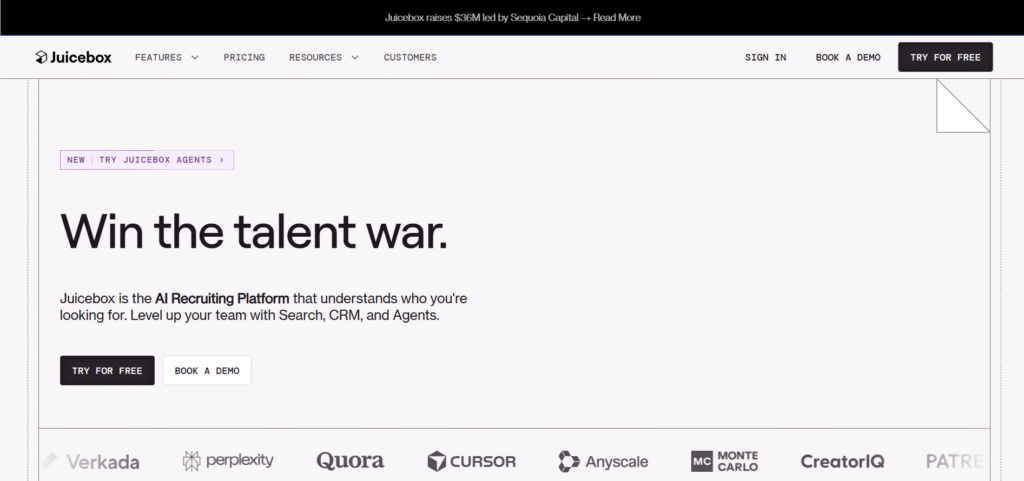
7. Canditech
Canditech focuses on AI-driven candidate assessments through interactive job simulations, coding tests, and video evaluations. The platform automatically scores results, ranks candidates, and provides structured insights on technical and soft skills — reducing bias and human error. It’s ideal for technical, customer service, and operations roles.
Best for:
Organizations that want skill-based, bias-free assessments before shortlisting candidates for interviews
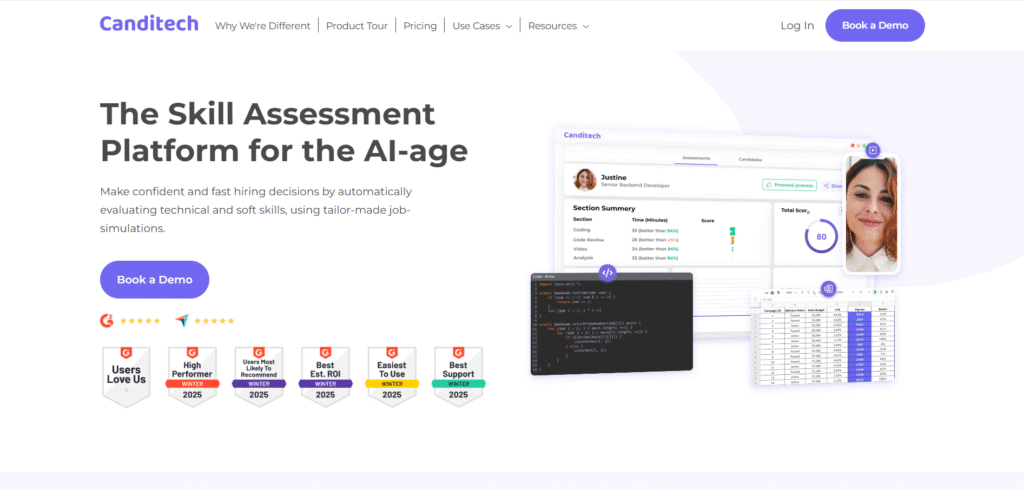
8. TurboHire
TurboHire combines automation and AI to streamline every step of recruitment — from resume parsing and candidate ranking to interview coordination and offer generation. Its conversational AI can also engage candidates via chat and WhatsApp. The tool is built with scalability in mind, making it ideal for enterprise or campus hiring drives.
Best for:
Companies with high hiring volumes or multiple open positions needing centralized AI coordination.
9. RecruitRyte
RecruitRyte is a new-age AI recruiting assistant that simplifies sourcing, screening, and communication through a single dashboard. It uses NLP (Natural Language Processing) to interpret resumes and job descriptions, rank matches, and automate outreach with human-like messages. Its interface is chat-based, intuitive, and designed for smaller HR teams.
Best for:
Startups and SMEs looking for an affordable, easy-to-use AI hiring assistant.
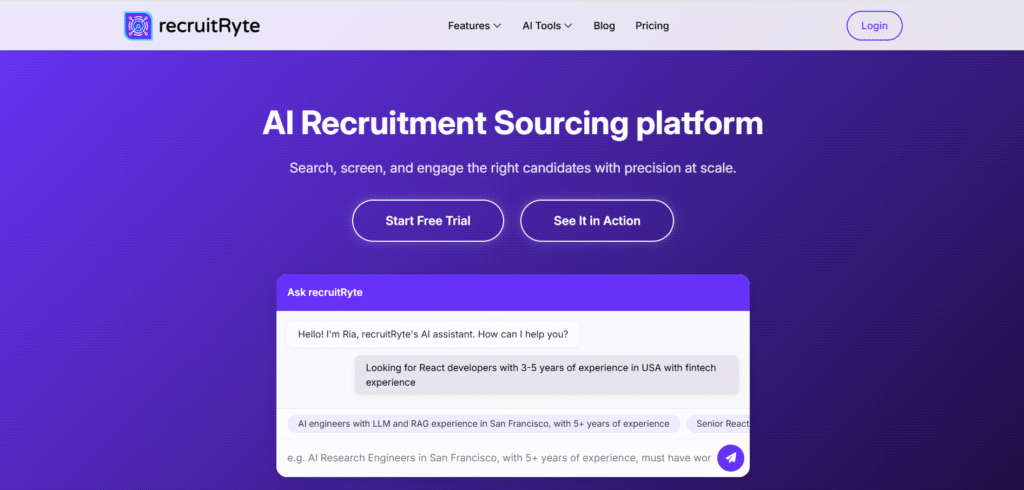
10. Torre.ai
Torre.ai is a fully automated recruitment platform that handles sourcing, screening, and candidate ranking. Using AI and behavioral data, it matches candidates not just on skills but also on cultural fit and work preferences. Torre’s automation extends to engagement, follow-ups, and re-engagement campaigns — making it nearly hands-off.
Best for:
Remote-first companies and digital teams that want AI-based, end-to-end recruiting automation.
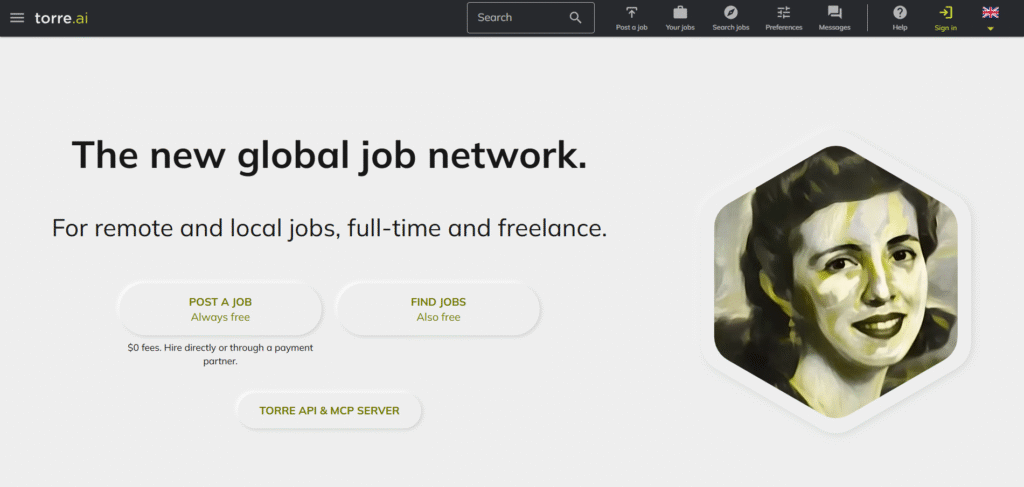
Features to Look for in AI Recruitment Tools
When selecting AI tools for job recruitment, consider the following features:
- Candidate Matching: Tools that use AI to match candidates with job openings based on skills, experience, and fit.
- Automation: Features that automate repetitive tasks like resume screening, scheduling, and initial candidate engagement.
- Analytics and Insights: Tools that provide data-driven insights into recruitment processes and candidate performance.
- Integration: Compatibility with existing HR systems and platforms for seamless workflow integration.
- User Experience: Tools that enhance candidate experience through personalized engagement and communication.
Benefits of Using AI Tools for Job Recruitment
Using AI tools in job recruitment offers numerous benefits:
- Efficiency: Automates time-consuming tasks, allowing recruiters to focus on strategic activities.
- Improved Matching: Enhances candidate-job matching accuracy, leading to better hiring outcomes.
- Diverse Talent Pool: Helps create inclusive job descriptions and reduce biases in the recruitment process.
- Enhanced Candidate Experience: Provides personalized engagement and faster responses to candidates.
- Data-Driven Decisions: Offers insights and analytics to support informed decision-making.
How AI Tools Enhance Recruitment Processes
AI tools enhance recruitment processes in several ways:
- Automated Screening: Tools like Ideal and HiredScore automate resume screening, reducing manual effort and speeding up the shortlisting process.
- Candidate Engagement: Mya Systems and XOR use AI chatbots to engage with candidates, answer their questions, and schedule interviews.
- Predictive Analytics: Entelo and Eightfold.ai use predictive analytics to identify and engage potential candidates proactively.
- Improved Job Descriptions: Textio enhances job descriptions to attract a more diverse and qualified candidate pool.
- Objective Assessments: HireVue and Pymetrics provide data-driven insights into candidates’ suitability through video interviews and cognitive assessments.
Challenges in Using AI Tools for Job Recruitment
While AI tools offer many benefits, they also come with challenges:
- Learning Curve: Some tools may require time to learn and integrate into existing workflows.
- Cost: High-quality AI tools can be expensive, which might be a barrier for smaller organizations.
- Data Privacy: Ensuring candidate data privacy and compliance with regulations is crucial.
- Bias: AI algorithms can sometimes perpetuate existing biases if not carefully managed and regularly audited.
Best Practices for Using AI Tools in Job Recruitment
To get the most out of AI tools for job recruitment, follow these best practices:
- Evaluate Needs: Assess your recruitment needs and choose tools that align with your objectives.
- Combine Tools: Use multiple tools to leverage their unique strengths and capabilities.
- Regular Audits: Regularly audit AI algorithms to ensure they are free from biases and comply with data privacy regulations.
- Training: Provide training for recruiters to effectively use AI tools and integrate them into their workflows.
- Monitor Performance: Continuously monitor the performance of AI tools and make adjustments as needed to improve efficiency and outcomes.
Future of AI in Job Recruitment
The future of AI in job recruitment is promising, with continuous advancements in technology offering even greater capabilities. Expect improvements in:
- Enhanced Predictive Analytics: More accurate predictions of candidate success and fit.
- Increased Personalization: AI-driven personalized candidate experiences and communication.
- Advanced Bias Mitigation: Improved algorithms to detect and mitigate biases in recruitment processes.
- Integration: Seamless integration with other HR technologies and platforms for a holistic recruitment strategy.
Top 10 AI Tools for Job Recruitment: Key Takeaways
- Eightfold AI – Uses deep learning to match, retain, and upskill talent through its powerful Talent Intelligence Platform.
- hireEZ – AI-powered sourcing engine that finds and engages top passive candidates across the web.
- Gem – All-in-one recruitment CRM that automates outreach, tracking, and analytics for hiring teams.
- Paradox (Olivia) – Conversational AI assistant that screens, schedules, and engages candidates 24/7.
- Fetcher – Combines AI and human verification to deliver pre-qualified candidates automatically.
- Juicebox (PeopleGPT) – Searches millions of profiles using natural language to instantly surface ideal candidates.
- Canditech – Creates realistic job simulations and AI-scored assessments to evaluate candidate skills fairly.
- TurboHire – Automates the entire hiring workflow from resume parsing to interview scheduling.
- RecruitRyte – Chat-based AI tool that simplifies sourcing, screening, and candidate communication.
- Torre.ai – Fully automated recruitment platform matching candidates by skills, fit, and preferences..
FAQs
What are the best AI tools for automating resume screening? Ideal and HiredScore are top choices for automating resume screening and candidate shortlisting.
How do AI tools improve candidate engagement? AI tools like Mya Systems and XOR use chatbots to engage with candidates, answer their questions, and schedule interviews, enhancing the candidate experience.
Can AI tools help create better job descriptions? Yes, Textio uses AI to analyze and improve job descriptions, making them more attractive to a diverse and qualified candidate pool.
Are AI tools for job recruitment expensive? The cost of AI tools varies, with some high-quality options being more expensive. However, the investment can lead to significant efficiency gains and better hiring outcomes.
How do AI tools ensure data privacy in recruitment? AI tools must comply with data privacy regulations and best practices. It’s essential to choose tools that prioritize data security and have robust privacy policies.
Can AI tools reduce biases in the recruitment process? Yes, AI tools can help reduce biases by providing objective data-driven insights. However, it’s crucial to regularly audit and manage these tools to ensure they don’t perpetuate existing biases.
Conclusion
AI tools for job recruitment are transforming the hiring process, offering new ways to streamline workflows, enhance candidate engagement, and improve decision-making. By automating repetitive tasks and providing data-driven insights, these tools enable recruiters to focus on strategic activities and make better hiring decisions. Whether you’re a small business or a large organization, integrating AI tools into your recruitment strategy can significantly elevate your hiring process and help you find the best talent.
